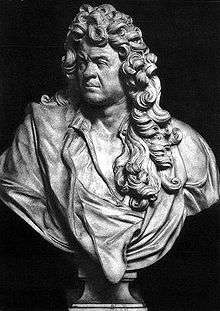Alceste (Lully)
| Jean-Baptiste Lully |
|---|
 |
|
Operas
|
Alceste, ou Le triomphe d’Alcide is a tragédie en musique in a prologue and five acts by Jean-Baptiste Lully. The French-language libretto is by Philippe Quinault, after Euripides’ Alcestis. It was first performed on 19 January 1674 at the Théâtre du Palais-Royal by the Paris Opera.
The opera was presented in celebration of King Louis XIV’s victory against Franche-Comté, and the prologue features nymphs longing for his return from battle. The opera itself concerns Alceste, princess of Iolcos and queen of Thessaly, who in the first act is abducted by Licomède (Lycomedes), king of Scyros, with the aid of his sister Thetis, a sea nymph; Aeolus, the god of the winds; and other supernatural forces. In the battle to rescue her, Alcide (Hercules) is triumphant, but Alceste’s husband, Admète (Admetus), suffers a mortal wound. Apollo agrees to let Admète live if someone will take his place in death. Alceste volunteers herself but is rescued by Alcide, who loves her. The opera ends with a celebration of Alceste’s return from the underworld and of Alcide’s noble gallantry in returning her to her husband and relinquishing any claims to her.
Alceste is Lully’s second tragédie en musique, after Cadmus et Hermione.
Roles
| Role | Voice type[1] | Premiere Cast, 19 January 1674 (Conductor: – ) |
|---|---|---|
| Nymph of the Seine | soprano | Mlle de Saint-Christophe (or Saint-Christophle) |
| La Gloire | soprano | Mlle de La Garde |
| Nymph of the Tuileries | soprano | Mlle Rebel |
| Nymph of the Marne | soprano | Mlle Ferdinand |
| Alceste, Princess of Iolcos | soprano | Mlle de Saint-Christophe |
| Admète, King of Thessaly | haute-contre | Bernard Clédière |
| Alcide (Hercules), Greek hero | baritone | François Beaumavielle |
| Licomède, King of Scyros and brother of Thetis | bass | Godonesche |
| Lychas, confidant of Alcide | haute-contre | Langeais |
| Straton, confidant of Lycomedes | bass | Antoine Morel |
| Céphise, confidante of Alcestis | soprano | Mlle Beaucreux |
| Cléante, knight of Admetus | tenor | Frizon |
| Pherès, father of Admetus | tenor | Gingan |
| Charon, | baritone | Antoine Morel |
| Pluton, | bass | Godonesche |
| Thétis, a sea-nymph | soprano | Mlle des Fronteaux (or Desfronteaux) |
| Apollon, | haute-contre | Le Roy |
| Proserpine, | soprano | Mlle Bony |
| The Ghost of Alcestis, | silent role | |
| Alecton, a Fury | haute-contre (en travesti) | Le Roy |
| A Rebuffed Ghost, | soprano | |
| Eole, King of the winds | baritone | Puvigny |
| Diane, | soprano | Mlle Piesche |
| Mercure (Mercury) | silent role | |
Synopsis
The musical numbers are as follows: 1. Marche Des Combattons 2. Menuet 3. Loure Pour Les Pecheurs 4. Echos 5. Rondeau De La Gloire 6. La Pompe Funebre 7. Rondeau Pour La Fête 8. Les Vents 9. La Fête Infernale 10. Les Demons 11. Marche Des Assiegeants
Prologue - The Nymph of the Seine longs for Louis XIV to return from battle. A Soprano assures her that he follows Glory and will return. A celebration of the pastoral divinities commences.
Act 1- At the wedding of Admetus and Alcestis. Under the guise of a party, Lycomedes abducts Alcestis. A following storm, perpetrated by his sister, the sea nymph Thetis, helps his escape.
Act 2
Act 3
Act 4
Act 5
.png)
Notable recordings
- Alceste with conductor Jean-Claude Malgoire and La Grande Ecurie et La Chambre du Roy. Cast includes: Jean-Philippe Lafont, Colette Alliot-Lugaz, Howard Crook, Veronique Gens, Francois Loup, Jean-Francois Gardeil, Gregory Reinhart, Olivier Lallouette, Gille Ragon, and Sophie-Marin Degor. Released in 1994 on the Astree label.
References
- Notes
- ↑ According to Rosow.
- Sources
- Lois Rosow. "Alceste (i)". In L. Root, Deane. Grove Music Online. Oxford Music Online. Oxford University Press. (subscription required)
- Le magazine de l'opéra baroque (accessed 29 December 2009)